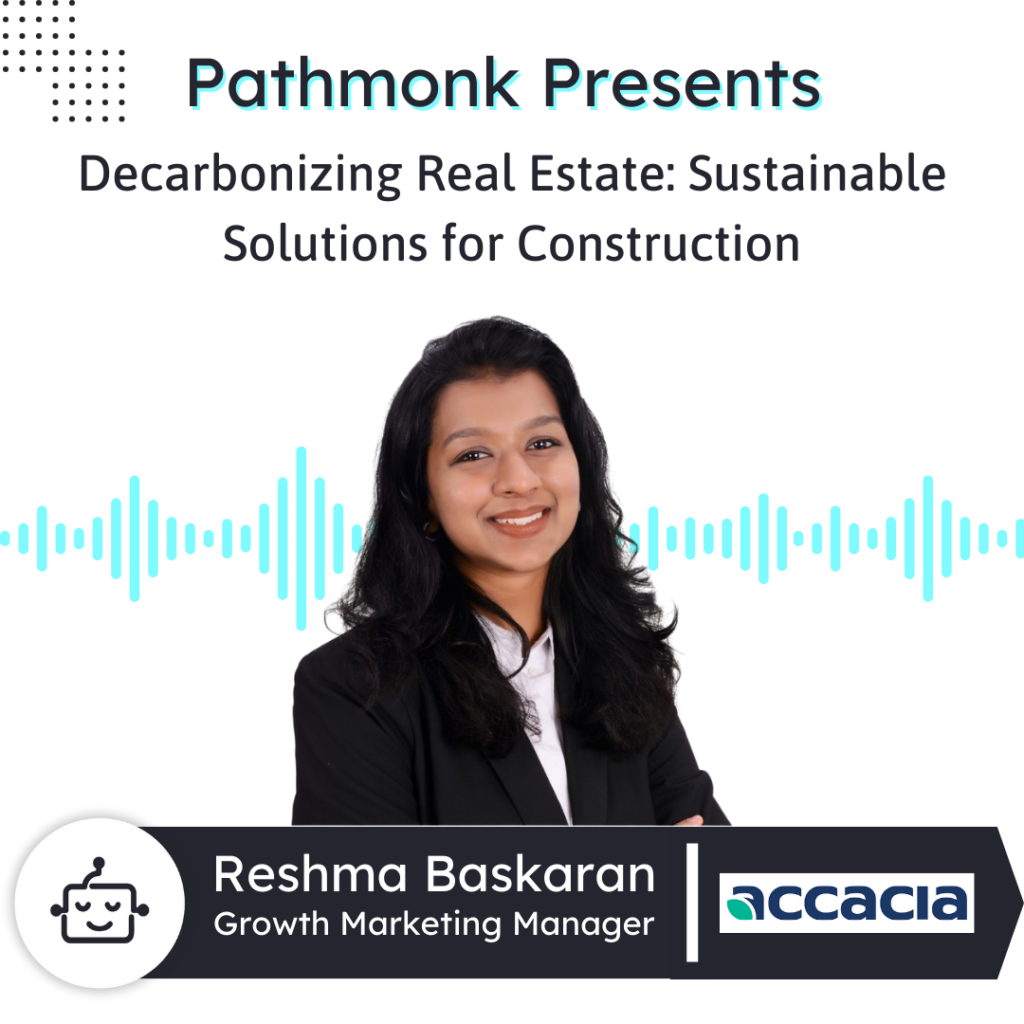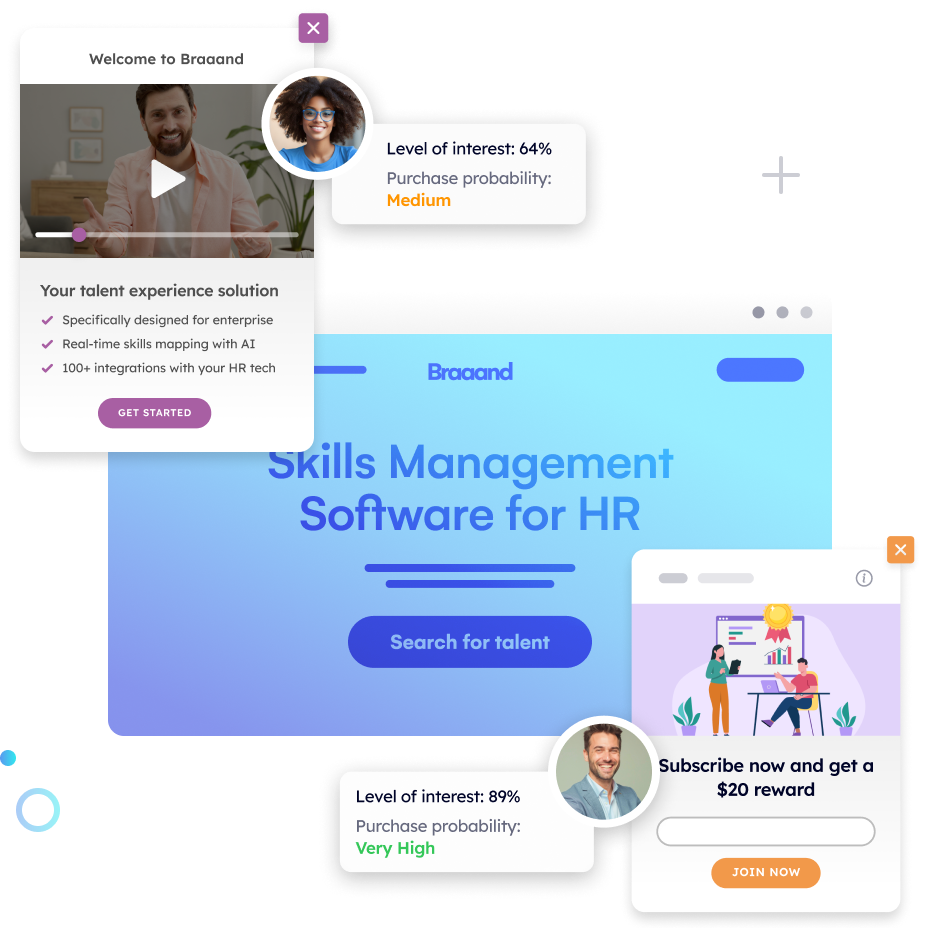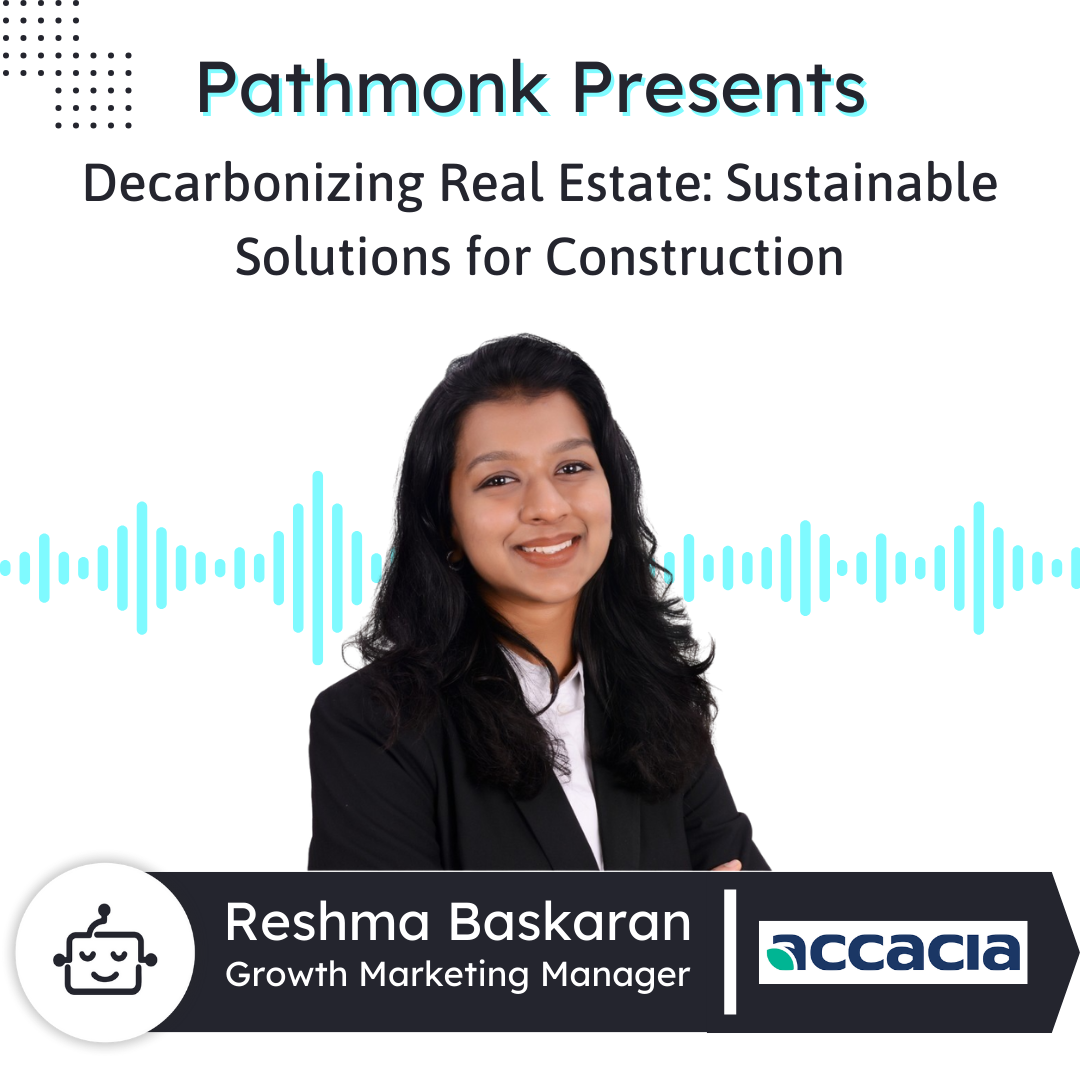
Introduction
Join us on Pathmonk Presents as we welcome Reshma Baskaran, Growth Marketing Manager at Accacia, a platform simplifying decarbonization for real estate.
In this episode, Reshma shares how Accacia helps track carbon emissions and promotes green construction with sustainable materials and energy-efficient solutions.
Discover their strategies for engaging a niche audience through networking, thought leadership, and a user-focused website. Reshma also dives into her day-to-day marketing tasks, offering insights on content creation and community-driven growth.
Tune in for actionable tips on building trust and driving conversions in a legacy industry committed to sustainability.
Increase +180% conversions from your website with AI
Get more conversions from your existing traffic by delivering personalized experiences in real time.
- Adapt your website to each visitor’s intent automatically
- Increase conversions without redesigns or dev work
- Turn anonymous traffic into revenue at scale

Kevin: Hey everybody. Welcome back to Pathmonk Presents. Pathmonk is the AI for website conversions. With increasing online competition, over 98% of website visitors don’t convert. The ability to successfully show your value proposition and support visitors in their buying journey separates you from the competition online.
Pathmonk qualifies and converts leads on your website by figuring out where they are in the buying journey and influencing them in key decision moments with relevant micro experiences like case studies, intro videos, and much more. Stay relevant to your visitors and increase conversions by 50% by adding Pathmonk to your website in seconds, letting the artificial intelligence do all the work. And increase conversions by 50% while you keep doing marketing as usual. Check us out on Pathmonk.com.
Hey everybody. Welcome back to another episode of Pathmonk Presents. We’re really excited for today’s episode. We’ve got Reshma, the Growth Marketing Manager over at Accacia. How you doing today, Reshma?
Reshma Baskaran: Hi Kevin. Thank you so much for having me. I’m doing great. How have you been?
Kevin: I’m doing very well. Thank you for asking. So we’re really looking forward to today’s episode and figuring out what you guys are doing from a digital marketing perspective over at Accacia. But before we dive into anything a little bit too deeply, why don’t you just give our audience a little bit of background. What is Accacia and what do you guys do over there?
Reshma Baskaran: Sure. So for the audience, to simplify this, I would say Accacia helps people track their carbon emissions in a simplified way. We simplify green construction as a whole. We realize that real estate contributes to about 40% of global carbon emissions, which is a lot. And it is also one of the industries which is very hard to decarbonize.
So Accacia is a full stack decarbonization platform for real estate, and we simplify green construction.
Kevin: Awesome. And maybe you can tell us a little bit about how you guys are doing this. Like how does the platform actually work, and maybe tell us how you’re helping your audience and what sort of solutions you’re providing.
Reshma Baskaran: Absolutely. So our main audience is real estate. And real estate contributes to about 40% of global emissions, which is a lot, and it is also one of the hardest sectors to decarbonize. So we help them with, like I mentioned, an end-to-end solution where we take care of their data collection, their reporting solutions, and we also equip them with green building materials and energy efficient solutions like solar panels, EV chargers.
We track all the metrics of how much energy is being used, how much water is being consumed, what is the waste that is generated when the construction happens. So we condense all this information about the real estate portfolio in our platform, and we equip them with the necessary details on how they can act on it.
Kevin: Interesting. So it sounds like you’re both recording the information about how eco-friendly real estate and construction businesses are when they’re putting up new properties, but you’re also giving them the tools to improve upon that themselves. Is that right?
Reshma Baskaran: Yes. We have two analyses: what we call embodied carbon and operational carbon. Embodied carbon is for all the properties that you see that are already built years ago. So we help them track the carbon emissions for properties that are constructed already, but we also help them track their current properties which are under operation.
We analyze what materials are being used and how they can choose much more sustainable materials as alternatives.
Kevin: Okay. Yeah, that totally makes sense. And I want to also make sure that we talk a little bit about what’s going on over there from a marketing and growth perspective. So maybe you can talk about how your audience typically finds out about you? It seems like a very niche market, obviously, right? Like we’re talking about the eco-friendly real estate construction space. So it sounds like a very—I don’t want to say small—audience, but it’s definitely not for everyone. So how does your audience typically find you currently?
Reshma Baskaran: Great question. As we all know, real estate and construction is a legacy industry, right? It’s been here for a long time, but it’s also been very slow to adapt in terms of technology because they need a lot of awareness and education, especially because sustainability and the things that we’re doing currently are very new in the ecosystem.
So some of the things that are helping us currently: we are part of associations like the Singapore Green Building Council. These are specific associations in the decarbonization and sustainability space where we have a huge network of real estate developers and ESG professionals. We meet them at industry events, there are a lot of networking sessions that happen globally that we are a part of, and our founders are constantly on the front lines, attending panels, webinars, and thought leadership programs. It helps us put a foot in the door. We have a lot of word of mouth that happens.
Apart from this, we also actively maintain a presence on LinkedIn and other social media platforms to get more eyeballs in this space, and that’s how we build up brand awareness.
Kevin: Okay, because it’s definitely a legacy industry, right? And it sounds like everyone in the industry probably has connections or knows each other, and there are events where everyone can get together. These are some awesome networking opportunities to make sure you’re getting together with the people who could really utilize your tools to the fullest.
Reshma Baskaran: Yes, absolutely. Trust is a very big factor when it comes to evaluating a platform like ours, especially because it’s a commitment. Once you sign up, it’s very hard for you to see results for the next one or two years, right? People set net zero targets for the next 10 years. It’s a slow process. So in order to build that trust—it comes with a lot of social proof as backing. And also you would naturally trust someone in the same space if they’ve heard about Accacia and there’s a good trust and relationship that is built. You would naturally resort to the same solution.
Kevin: I find that really interesting because there are so many products out there that say something like, “results in one week” or “one month.” And this is definitely not the tool that’s going to provide initial results immediately. So yeah, having that trust and proper expectations, making sure clients really understand who you are and what you’re going to deliver and within what timeframe—that sounds very interesting. It goes against what a lot of people are doing in other sales areas.
Reshma Baskaran: Absolutely. You do see immediate results, let’s say, if you’re building something new. If you have a fresh start, we obviously recommend you sustainable materials from the get-go, and then you’ll be able to realize the results of your initiative. But if your property has been releasing carbon emissions for the last 20–30 years, it’s not going to drop to zero overnight. It’s a slow process. But we are with you throughout that journey, guiding you every step so that eventually you’ll meet your net zero goals or targets.
Kevin: Really interesting. This is such a new industry for me, so I’m really curious about it. I want to move on and start talking about your website a little bit because I know the website is the core when it comes to bringing in new traffic. It’s like the face of the business. For anyone that wants to learn about who you guys are and what you do, maybe you can tell us what role the website plays in terms of client acquisition? Because it sounds like there’s a lot of social proof and networking—people need to know who you are. So it’s probably not necessarily a website straight for conversions but maybe as an educational tool. So yeah, tell me—how does the website play a role in client acquisition?
Reshma Baskaran: Great. Also, you’re absolutely right. Website is definitely the first handshake that happens with our prospective clients. Although consumers might be seeing us through a social media post or probably a YouTube video, or someone might come through this podcast and they’d probably research—the first thing they do is check out our website.
So I think the basic hygiene of a website is simplicity and specificity. It shouldn’t confuse the audience—the message you’re trying to put across should be conveyed in the first five seconds. And again, I go back to social proof. That’s why every company has their client logos right in front for display: to say, “Hey, we do have other people who have trusted us, and so can you.”
Along with logos come testimonials. It’s very important to establish good relationships with clients and get them on your side, so others can relate if they’re in the same industry.
To put it in short: simplicity, specificity, past social proof, and conveying the message without confusing the audience—and you should be good.
Kevin: Okay. And that kind of relates to my next question as well. When we talk about what makes a great converting website, everyone has their own opinion. Especially if you’re in, say, e-commerce selling shoes versus Accacia, who’s dealing with high-ticket contracts with real estate businesses. So what are some tools, tips, or methods you might recommend?
Reshma Baskaran: I think more than tools, it’s the tips: guide the user on their journey with the right call to action. If they’re on the website, they’re definitely trying to solve a real pain point. Assuming a real estate developer is on our site, they’re probably trying to figure out how to set or meet ESG goals or reduce carbon emissions.
So if the pain points are stated on the website with solutions, and you’re guiding them through: “Hey, this is your next step” (a CTA), that takes them to a landing page with more details about the problem, then to a free trial or demo, or a one-on-one call—that seamless guidance removes guesswork and leads to a high conversion rate.
Kevin: So not just putting information on there just for the sake of having content or keywords—but really building it so there’s a journey. Making sure they see the pain point first, then the solution, and then qualifying that solution. Sounds like building that journey is key to a great converting website. I totally agree.
We’re moving into the next section of the conversation, and this is going to be a little more focused on Reshma as a marketing professional. To start off with a relatively playful question—maybe you can tell us about your day-to-day work. What are the activities you focus on, and what takes up most of your time on a typical day?
Reshma Baskaran: Wow. In an early-stage startup, you do a bit of everything. But to summarize my role as a marketer: I take care of content marketing, social media marketing, and website optimization.
Our current website is undergoing an overhaul because we are introducing new offerings—like our panels and EV chargers—which will transform our industry. These might not be on our current site yet because it’s a new GTM. Alongside that, I’m working on demand generation and lead generation, building cadences and messaging for our sales team to use in outreach—basically equipping every team with the right narrative so that our audience connects with us.
Kevin: Got it. And in terms of ongoing social, marketing, and lead generation, are there tasks that consume most of your time? Is it testing different messages? Waiting on designs? Anything that takes too long in your day?
Reshma Baskaran: Yes. I think many would relate to this—writing the same message for multiple channels. Let’s say there’s a product like green cement. I want to write a blog on it. The tone and messaging for the blog will be different from LinkedIn, Medium, a website snippet, a cold email, or a newsletter.
It’s the same product marketed on different channels, but the narrative and structure need to be different. That takes a lot of time—writing the same thing in different ways. If that could be streamlined, it would be great.
Kevin: And not just the tone, but the platform’s own character limits or guidelines. A blog might need 600–900 keyword-optimized words, LinkedIn limits you to about 800–900 characters. You’re always adjusting to these formats. But it’s all the same idea—green cement, like you said. Really interesting. Well put.
Next, with so much content out there and the need to constantly improve, where do you go to grow and perform better at your job?
Reshma Baskaran: One platform that’s helping me immensely is Reddit. Whatever the problem—say, social media marketing—there are multiple subreddits already built for it. Just type it in, and you’ll find threads where users face the same problem, may have solved it, or are currently working through it. You have a mini community of problem solvers.
It’s not cluttered at all—you go straight to the problem, find solutions, and get back to your work. Aside from Reddit, I’m part of a growth marketing community that meets every other weekend. We’re about 400 people. We meet casually, pick a theme—like performance marketing—discuss problems, and someone always has a solution. It’s chill and useful at the same time.
Kevin: Sounds really nice. Definitely leveraging your network. And yes—Reddit is great. If you have a problem, chances are someone else had it too. Smart move.
We’re into the final section—these are more thought-provoking and friendly questions. Let’s start easy: what’s the last book you read?
Reshma Baskaran: I’m rereading Never Split the Difference by Chris Voss. It became popular for all the right reasons. One message that stuck with me is: lead with empathy, not the problem. It applies to your employees, customers, relationships. Try to understand the pain point before reacting. Empathize first, and you’ll usually already have the solution.
Kevin: Wise words. I think I’ll add that to my list.
Next: if there were no boundaries in tech—sci-fi world, anything possible—what’s one thing you’d want fixed in your marketing role?
Reshma Baskaran: I’d want a tool that tells me what my customer is thinking and feeling at this exact moment so I can tailor my messaging accordingly. If they’re in a happy mood—maybe they just got promoted—I could congratulate them or send flowers with a note. If they’re having a bad day, I won’t send that email.
A lot of time is spent second-guessing and AB testing. But if I had real-time updates on what the customer is doing, feeling, and needing, it would make our jobs so much easier.
Kevin: Oh yeah. Your open rate and success rate would skyrocket. Most emails land when the person just isn’t in the right mindset. Really good answer.
Next: if you could automate one repetitive task, what would it be?
Reshma Baskaran: Definitely writing the same message for different channels. If I could just write it once—say, for a blog—and then have a tool that replicates it based on platform, tone, and persona for all other formats, that would save tons of time.
Kevin: That’s a good one. For sure.
Final question: what’s one piece of advice you’d give yourself if you were restarting your marketing career today?
Reshma Baskaran: In the early days of my career, I focused a lot on “me” instead of “you.” I’ve since learned to focus on the customer—talk about them more than yourself. Talk about their pain points and what they’re going through instead of pitching what you built. If you make it about them, they’ll be more open to listening. If I’d done that from day one, I would’ve gotten more clients and conversions.
Kevin: That’s wise. A lot of marketers will relate. It takes too long for most people to learn that.
Thank you, Reshma, for joining us today. We really loved having you on the show. Your answers were awesome. Before we go, why don’t you give our audience one last elevator pitch about Accacia?
Reshma Baskaran: Thank you so much. For everyone watching: Accacia simplifies green construction. We are a full-stack decarbonization solution that helps real estate reduce their carbon emissions. We measure, track, and help you report them so you’re always ahead and prepared to reach your net-zero targets.
We also help with solutions—green building materials like green cement, green steel, and energy-efficient solutions like solar panels and EV chargers. That’s coming soon—so watch out for that.
Kevin: Awesome. Thank you so much for the time today, Reshma. Hope you have an awesome day.
Reshma Baskaran: Thank you so much for having me, Kevin. Take care.




